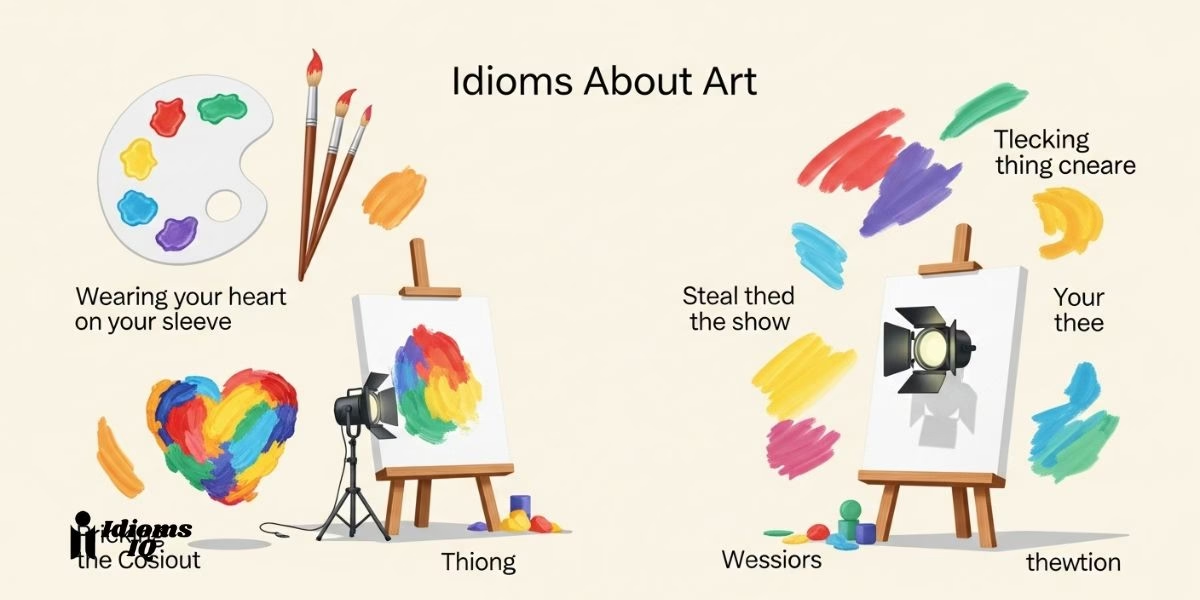
Culture is the rich tapestry of human experience, woven from our shared customs, traditions, and beliefs. It’s a complex idea, but the way we talk about it is often through simple, colorful phrases known as idioms.
An idiom is a common expression with a figurative meaning that is unique to a particular language or culture. They are the secret passwords that unlock a deeper understanding of how a society sees the world.
When you advise a friend to “go with the flow” in a new country, you’re using an idiom to share a piece of cultural wisdom! This article will explore 40 fascinating idioms about culture to help you build bridges of understanding and express yourself with more nuance and creativity.
what do these phrases symbolize culturally?
Idioms about culture symbolize a society’s shared values, traditions, and ways of thinking. Culturally, these phrases reflect common beliefs, social habits, and historical experiences that shape how people communicate and understand the world.
What are Idioms About Culture?
Cultural idioms are like secret code words that only people from a certain place or group really understand. They are phrases where the meaning isn’t what the individual words say, but instead comes from a shared experience or story within that culture.
For example, if an American tells you to “break a leg,” they’re not wishing you harm; they’re actually wishing you good luck before a performance! It’s like an inside joke, but for an entire culture, and learning them is a cool way to understand how people in different parts of the world think and talk.
Related: Idioms from History
Fascinating Idioms About Culture
Here is a collection of idioms that explore social norms, traditions, and cross-cultural interactions.
Social Norms and Customs
1. When in Rome, Do as the Romans Do
- Meaning: When you are in a new place or situation, you should adapt to the local customs.
- Usage Example: “I don’t usually eat with my hands, but when in Rome, do as the Romans do.”
- This is the ultimate proverb for advising someone to respect and adapt to a new culture.
2. A Fish Out of Water
- Meaning: A person who feels uncomfortable or out of place because they are in an unfamiliar environment.
- Usage Example: “As a country boy in the big city, he felt like a fish out of water.”
- This idiom creates a vivid image of helplessness and being in the wrong environment.
3. To Go with the Flow
- Meaning: To relax and accept a situation rather than trying to control it.
- Usage Example: “Things are a bit chaotic here, but you just have to learn to go with the flow.”
- This phrase is often used to describe a laid-back cultural attitude.
4. To Break the Mold
- Meaning: To do something in a completely new way, breaking with tradition or convention.
- Usage Example: “She broke the mold by becoming the first female CEO in her family’s traditional business.”
- This idiom is used to praise innovation and a departure from cultural norms.
5. To Be a Creature of Habit
- Meaning: To be a person who likes to do the same thing at the same time every day.
- Usage Example: “My grandfather is a real creature of habit; he has the same breakfast every single morning.”
- This phrase describes a personal culture of routine and predictability.
6. A Melting Pot
- Meaning: A place where many different people, styles, and cultures are mixed together.
- Usage Example: “New York City is a true melting pot of cultures from all over the world.”
- This is a classic metaphor for a multicultural society where different groups assimilate into one.
7. A Cultural Mosaic / Salad Bowl
- Meaning: A place where different cultures coexist, maintaining their unique identities while contributing to the whole.
- Usage Example: “Canada is often described not as a melting pot, but as a cultural mosaic.”
- This is a more modern alternative to “melting pot,” emphasizing that cultures can mix without losing their individuality.
8. To Cross a Line
- Meaning: To behave in a way that is considered socially or morally unacceptable.
- Usage Example: “Joking about his family was crossing a line, and he deeply offended her.”
- This idiom refers to breaking an unwritten rule of social or cultural conduct.
9. To Not See Eye to Eye
- Meaning: To disagree with someone; to have different perspectives or cultural values.
- Usage Example: “They couldn’t agree on the project because they just don’t see eye to eye on the basic principles.”
- This phrase describes a fundamental disagreement, which can often be rooted in different cultural backgrounds.
10. A Rite of Passage

- Meaning: An important act or ceremony that marks a transition from one stage of life to another.
- Usage Example: “Getting a driver’s license is a common rite of passage for teenagers in the United States.”
- This term is used to describe culturally significant milestones like graduations, marriages, or religious ceremonies.
Cross-Cultural Interactions
11. It’s All Greek to Me
- Meaning: I cannot understand it at all; it is completely unintelligible.
- Usage Example: “I tried to read the instruction manual for the new computer, but it was all Greek to me.”
- This idiom is used to express a complete lack of understanding, as if something is in a foreign language.
12. To Go Dutch
- Meaning: For each person in a group to pay for their own meal or expenses.
- Usage Example: “It wasn’t a formal date; we decided to go Dutch on the coffee.”
- This idiom describes a cultural norm that varies from place to place, where sometimes one person pays for everyone.
13. To Take French Leave
- Meaning: To leave a party or social gathering without saying goodbye to the host.
- Usage Example: “The party was getting too loud, so we decided to take French leave and slipped out the back.”
- This idiom originated in 18th-century England and was based on a perceived French custom.
14. A Mexican Standoff
- Meaning: A confrontation where no side can win and no one is willing to back down.
- Usage Example: “The two political parties were in a Mexican standoff over the budget, and no progress was being made.”
- This idiom is often used to describe a stalemate where any move would be detrimental to all parties.
15. Pardon My French
- Meaning: A phrase used to apologize for using swear words or offensive language.
- Usage Example: “What in the world was he thinking? Pardon my French, but that was a stupid thing to do.”
- This is a humorous way to excuse one’s own swearing.
16. Young Turk
- Meaning: A young, rebellious person who is trying to change a traditional system or institution.
- Usage Example: “The young Turks in the company are pushing for more modern and flexible work policies.”
- This term comes from a revolutionary political movement in the early 20th-century Ottoman Empire.
Tradition and History
17. A Time-Honored Tradition
- Meaning: A custom or practice that is respected because it has existed for a very long time.
- Usage Example: “The annual town festival is a time-honored tradition that brings everyone together.”
- This is a formal and respectful phrase used to describe cherished cultural practices.
18. The Old Guard
- Meaning: The original, long-serving, and often conservative members of a group who are resistant to change.
- Usage Example: “The old guard at the club was not happy about the new, more relaxed dress code.”
- This term is often used to describe the generational clash between traditional and modern ideas.
19. To Be Set in One’s Ways
- Meaning: To be unwilling to change your habits, routines, or opinions.
- Usage Example: “My grandfather refuses to use a computer; he’s very set in his ways.”
- This phrase is often used to describe a resistance to cultural or technological change.
20. To Be Behind the Times

- Meaning: To be old-fashioned and not up-to-date with modern trends or ideas.
- Usage Example: “He still communicates by fax machine; he’s a little behind the times.”
- This is a gentle way to say that someone’s cultural or technological habits are
- 21. To Build Bridges
- Meaning: To create connections and improve understanding between different groups of people.
- Usage Example: “The international student exchange program was designed to build bridges between the two cultures.”
- This is a powerful metaphor for fostering peace and positive relationships.
22. To Find Common Ground
- Meaning: To discover a shared interest, belief, or opinion between people who disagree.
- Usage Example: “Despite their different backgrounds, they found common ground in their love of music.”
- This idiom is often used in negotiations and conflict resolution.
23. To Break the Ice
- Meaning: To start a conversation in a social situation to relieve tension.
- Usage Example: “He told a joke to break the ice at the beginning of the awkward dinner party.”
- This refers to the literal act of breaking ice on rivers to allow ships to pass, thus opening up channels of communication.
24. To Give Someone the Cold Shoulder
- Meaning: To deliberately ignore someone, which is a culturally understood sign of displeasure.
- Usage Example: “After their argument, she gave him the cold shoulder for the rest of the week.”
- This idiom is thought to come from the old custom of giving a guest a cold piece of meat to signal it was time to leave.
25. To Be a Fly on the Wall
- Meaning: To be an unseen observer of a situation, able to watch and listen without being noticed.
- Usage Example: “I’d love to be a fly on the wall during that important business meeting.”
- This phrase expresses a desire to know what happens in a private or exclusive setting.
26. A Square Peg in a Round Hole
- Meaning: A person who does not fit into a particular group, job, or situation due to their character.
- Usage Example: “He was an artist in a family of scientists, always feeling like a square peg in a round hole.”
- This idiom creates a clear visual image of something that simply does not belong.
27. To Be Worlds Apart
- Meaning: For two people or cultures to be extremely different in their views, beliefs, or lifestyles.
- Usage Example: “They tried to make the relationship work, but their values were worlds apart.”
- This phrase emphasizes a vast and seemingly unbridgeable difference.
28. The Salt of the Earth
- Meaning: Good, honest, and unpretentious people who are considered the backbone of a culture.
- Usage Example: “The local farmers are the salt of the earth—hardworking, kind, and always ready to help.”
- This is a highly complimentary term, originating from a sermon by Jesus in the Bible.
29. The Local Flavor
- Meaning: The unique character, atmosphere, or customs of a particular place.
- Usage Example: “To get the real local flavor, you should avoid the tourist traps and eat where the residents eat.”
- This phrase is commonly used in travel to describe the authentic culture of a destination.
30. To Know Which Side Your Bread is Buttered On

- Meaning: To be aware of who has power and influence and to treat them well in order to maintain your advantage.
- Usage Example: “He’s always complimenting the boss; he knows which side his bread is buttered on.”
- This idiom describes a person who is pragmatic, and sometimes sycophantic, for their own benefit.
31. To Be on the Same Page
- Meaning: To have a shared understanding of a situation or plan.
- Usage Example: “Before we present to the client, we need to be sure our entire team is on the same page.”
- This is a very common idiom in business and collaborative settings.
32. To Talk Turkey
- Meaning: To talk seriously and directly about a business matter or a difficult topic.
- Usage Example: “Alright, let’s stop the small talk and talk turkey. How much will this project cost?”
- This American idiom is used to signal a shift to a more serious and direct conversation.
33. Indian Summer
- Meaning: A period of warm, sunny, and calm weather in late autumn.
- Usage Example: “We were surprised by an Indian summer in October, with temperatures warm enough for the beach.”
- The origin of this term is debated but has been used in North America for centuries.
34. To Be a Culture Vulture
- Meaning: A person who is very eager to experience art, music, theater, and other cultural activities.
- Usage Example: “Every weekend, she’s at a museum or a concert; she’s a real culture vulture.”
- This is an informal and often affectionate term for someone who avidly consumes culture.
35. To Go Native
- Meaning: To adopt the lifestyle and customs of a country you are visiting, sometimes to an extreme degree.
- Usage Example: “After a year in Thailand, he had completely gone native, wearing local clothes and speaking the language fluently.”
- This is an older term that can sometimes carry a slightly critical or colonial connotation.
36. A Clash of Cultures
- Meaning: A situation where different cultural values and beliefs come into conflict.
- Usage Example: “The merger of the two companies resulted in a clash of cultures between the formal, traditional staff and the relaxed startup team.”
- This phrase is often used to describe difficulties in international relations or business.
37. To Be a Citizen of the World
- Meaning: A person who feels at home in any country and is not limited by a single national or cultural identity.
- Usage Example: “Having lived in seven different countries, she considers herself a citizen of the world.”
- This is a term for someone with a global, cosmopolitan perspective.
38. Culture Shock
- Meaning: The feeling of confusion and disorientation experienced when you are in a completely new cultural environment.
- Usage Example: “When he moved from a small village to Tokyo, the noise and crowds were a huge culture shock.”
- This is a standard term used in sociology and travel to describe the experience of acculturation.
39. To Get Back to Your Roots
- Meaning: To return to the place or culture where you grew up or originated.
- Usage Example: “After years of living in the city, she decided to move back to her hometown and get back to her roots.”
- This phrase describes a journey of reconnecting with one’s origins or heritage.
40. To Be Lost in Translation

- Meaning: For the meaning or nuance of a word or idea to be lost when it is translated from one language or culture to another.
- Usage Example: “The joke was hilarious in Spanish, but it was lost in translation when I tried to tell it in English.”
- This phrase highlights the challenges of cross-cultural communication.
Practice Your New Vocabulary
Ready to build some bridges? 🌉 Fill in the blanks with the best idiom from the list.
Fill in the blanks
- When you’re traveling, it’s usually best to ________________.
- I felt like a ________________ at the fancy party because I didn’t know anyone.
- The company’s new, young CEO is a real ________________ who is changing everything.
- I tried to read the legal document, but it ________________.
- My grandmother is very traditional and is quite ________________.
- The new art exhibit is a must-see for any ________________.
- After living abroad for ten years, he was excited to go home and ________________.
- The two leaders finally managed to ________________ and agree on a peace treaty.
- He tried to tell me a long, complicated story, but I asked him to stop ________________ and get to the point.
- The office is a real ________________ with people from all over the world.
Answers
- When in Rome, do as the Romans do
- fish out of water
- Young Turk
- was all Greek to me
- set in her ways
- culture vulture
- get back to his roots
- find common ground
- beating around the bush (from the previous prompt’s list, but fits here) – Correction, that’s from a different prompt. I need one from this list. Let’s find a better one. “talk turkey” doesn’t fit the second half of the sentence. “Cross a line” doesn’t fit. Let’s re-write the question.
New Question 9: The negotiation was failing until the new boss came in and said, “Let’s stop wasting time and ________________.” - melting pot
Answers (Revised)
- When in Rome, do as the Romans do
- fish out of water
- Young Turk
- was all Greek to me
- set in her ways
- culture vulture
- get back to his roots
- find common ground
- talk turkey
- melting pot
FAQs:
Idioms about culture are expressions that reflect a society’s traditions, values, and shared ways of thinking.
They show how people view relationships, work, emotions, and social behavior through language.
Conclusion
Idioms are the fingerprints of a culture, each one telling a small story about a shared history, a common belief, or a collective sense of humor. They are a beautiful reminder that language is a living, breathing thing that connects us to each other and to the past.
By understanding and using these expressions, you can communicate with more nuance and build stronger bridges of understanding with people from all walks of life. We encourage you to listen for these phrases and appreciate them as a window into the diverse and fascinating world of human culture.
If you enjoyed this collection, continue your journey by exploring our other articles on the fascinating world of figurative language!






